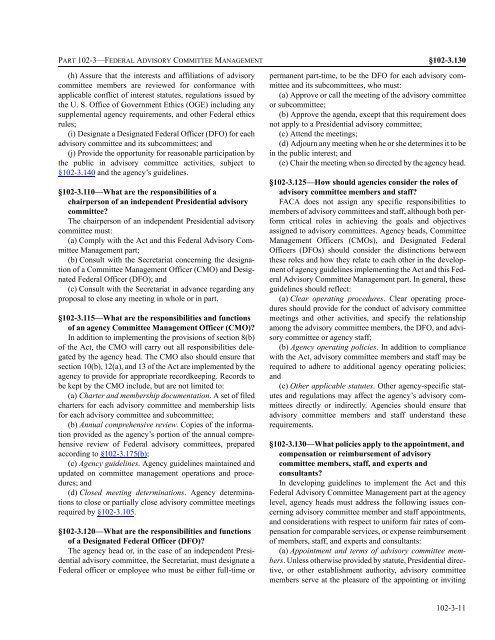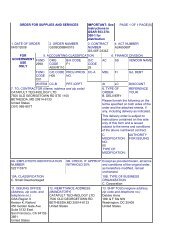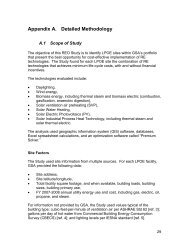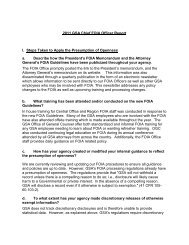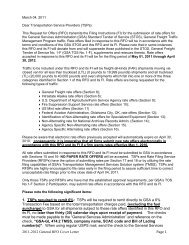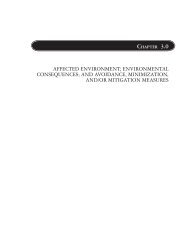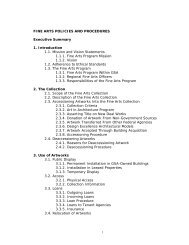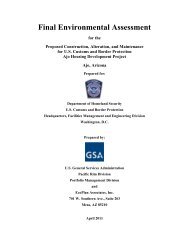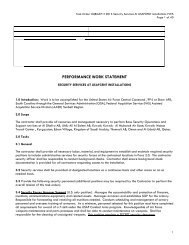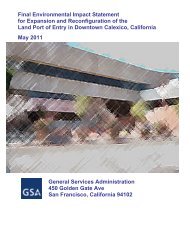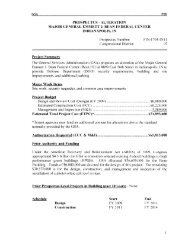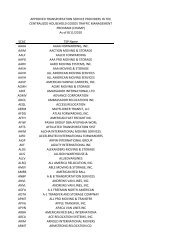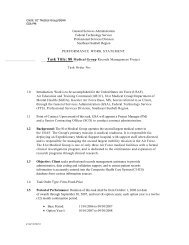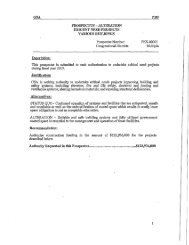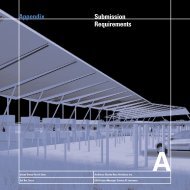FEDERAL MANAGEMENT REGULATION - GSA
FEDERAL MANAGEMENT REGULATION - GSA
FEDERAL MANAGEMENT REGULATION - GSA
You also want an ePaper? Increase the reach of your titles
YUMPU automatically turns print PDFs into web optimized ePapers that Google loves.
PART 102-3—<strong>FEDERAL</strong> ADVISORY COMMITTEE <strong>MANAGEMENT</strong> §102-3.130<br />
(h) Assure that the interests and affiliations of advisory<br />
committee members are reviewed for conformance with<br />
applicable conflict of interest statutes, regulations issued by<br />
the U. S. Office of Government Ethics (OGE) including any<br />
supplemental agency requirements, and other Federal ethics<br />
rules;<br />
(i) Designate a Designated Federal Officer (DFO) for each<br />
advisory committee and its subcommittees; and<br />
(j) Provide the opportunity for reasonable participation by<br />
the public in advisory committee activities, subject to<br />
§102-3.140 and the agency’s guidelines.<br />
§102-3.110—What are the responsibilities of a<br />
chairperson of an independent Presidential advisory<br />
committee?<br />
The chairperson of an independent Presidential advisory<br />
committee must:<br />
(a) Comply with the Act and this Federal Advisory Committee<br />
Management part;<br />
(b) Consult with the Secretariat concerning the designation<br />
of a Committee Management Officer (CMO) and Designated<br />
Federal Officer (DFO); and<br />
(c) Consult with the Secretariat in advance regarding any<br />
proposal to close any meeting in whole or in part.<br />
§102-3.115—What are the responsibilities and functions<br />
of an agency Committee Management Officer (CMO)?<br />
In addition to implementing the provisions of section 8(b)<br />
of the Act, the CMO will carry out all responsibilities delegated<br />
by the agency head. The CMO also should ensure that<br />
section 10(b), 12(a), and 13 of the Act are implemented by the<br />
agency to provide for appropriate recordkeeping. Records to<br />
be kept by the CMO include, but are not limited to:<br />
(a) Charter and membership documentation. A set of filed<br />
charters for each advisory committee and membership lists<br />
for each advisory committee and subcommittee;<br />
(b) Annual comprehensive review. Copies of the information<br />
provided as the agency’s portion of the annual comprehensive<br />
review of Federal advisory committees, prepared<br />
according to §102-3.175(b);<br />
(c) Agency guidelines. Agency guidelines maintained and<br />
updated on committee management operations and procedures;<br />
and<br />
(d) Closed meeting determinations. Agency determinations<br />
to close or partially close advisory committee meetings<br />
required by §102-3.105.<br />
§102-3.120—What are the responsibilities and functions<br />
of a Designated Federal Officer (DFO)?<br />
The agency head or, in the case of an independent Presidential<br />
advisory committee, the Secretariat, must designate a<br />
Federal officer or employee who must be either full-time or<br />
permanent part-time, to be the DFO for each advisory committee<br />
and its subcommittees, who must:<br />
(a) Approve or call the meeting of the advisory committee<br />
or subcommittee;<br />
(b) Approve the agenda, except that this requirement does<br />
not apply to a Presidential advisory committee;<br />
(c) Attend the meetings;<br />
(d) Adjourn any meeting when he or she determines it to be<br />
in the public interest; and<br />
(e) Chair the meeting when so directed by the agency head.<br />
§102-3.125—How should agencies consider the roles of<br />
advisory committee members and staff?<br />
FACA does not assign any specific responsibilities to<br />
members of advisory committees and staff, although both perform<br />
critical roles in achieving the goals and objectives<br />
assigned to advisory committees. Agency heads, Committee<br />
Management Officers (CMOs), and Designated Federal<br />
Officers (DFOs) should consider the distinctions between<br />
these roles and how they relate to each other in the development<br />
of agency guidelines implementing the Act and this Federal<br />
Advisory Committee Management part. In general, these<br />
guidelines should reflect:<br />
(a) Clear operating procedures. Clear operating procedures<br />
should provide for the conduct of advisory committee<br />
meetings and other activities, and specify the relationship<br />
among the advisory committee members, the DFO, and advisory<br />
committee or agency staff;<br />
(b) Agency operating policies. In addition to compliance<br />
with the Act, advisory committee members and staff may be<br />
required to adhere to additional agency operating policies;<br />
and<br />
(c) Other applicable statutes. Other agency-specific statutes<br />
and regulations may affect the agency’s advisory committees<br />
directly or indirectly. Agencies should ensure that<br />
advisory committee members and staff understand these<br />
requirements.<br />
§102-3.130—What policies apply to the appointment, and<br />
compensation or reimbursement of advisory<br />
committee members, staff, and experts and<br />
consultants?<br />
In developing guidelines to implement the Act and this<br />
Federal Advisory Committee Management part at the agency<br />
level, agency heads must address the following issues concerning<br />
advisory committee member and staff appointments,<br />
and considerations with respect to uniform fair rates of compensation<br />
for comparable services, or expense reimbursement<br />
of members, staff, and experts and consultants:<br />
(a) Appointment and terms of advisory committee members.<br />
Unless otherwise provided by statute, Presidential directive,<br />
or other establishment authority, advisory committee<br />
members serve at the pleasure of the appointing or inviting<br />
102-3-11


